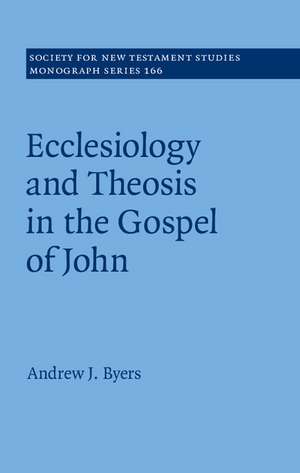Ecclesiology and Theosis in the Gospel of John: Society for New Testament Studies Monograph Series, cartea 166
Autor Andrew J. Byersen Limba Engleză Hardback – 15 iun 2017
Din seria Society for New Testament Studies Monograph Series
- 14%
 Preț: 727.91 lei
Preț: 727.91 lei -
 Preț: 177.24 lei
Preț: 177.24 lei - 11%
 Preț: 584.77 lei
Preț: 584.77 lei -
 Preț: 202.36 lei
Preț: 202.36 lei -
 Preț: 285.54 lei
Preț: 285.54 lei - 11%
 Preț: 582.54 lei
Preț: 582.54 lei -
 Preț: 303.71 lei
Preț: 303.71 lei -
 Preț: 415.12 lei
Preț: 415.12 lei -
 Preț: 203.12 lei
Preț: 203.12 lei -
 Preț: 311.22 lei
Preț: 311.22 lei -
 Preț: 284.39 lei
Preț: 284.39 lei -
 Preț: 372.37 lei
Preț: 372.37 lei -
 Preț: 308.50 lei
Preț: 308.50 lei -
 Preț: 206.18 lei
Preț: 206.18 lei -
 Preț: 414.96 lei
Preț: 414.96 lei -
 Preț: 373.26 lei
Preț: 373.26 lei -
 Preț: 371.23 lei
Preț: 371.23 lei -
 Preț: 373.56 lei
Preț: 373.56 lei -
 Preț: 420.08 lei
Preț: 420.08 lei -
 Preț: 203.50 lei
Preț: 203.50 lei -
 Preț: 306.00 lei
Preț: 306.00 lei -
 Preț: 375.09 lei
Preț: 375.09 lei -
 Preț: 322.79 lei
Preț: 322.79 lei -
 Preț: 320.12 lei
Preț: 320.12 lei -
 Preț: 320.88 lei
Preț: 320.88 lei -
 Preț: 284.56 lei
Preț: 284.56 lei -
 Preț: 388.73 lei
Preț: 388.73 lei -
 Preț: 423.14 lei
Preț: 423.14 lei -
 Preț: 305.08 lei
Preț: 305.08 lei - 14%
 Preț: 683.45 lei
Preț: 683.45 lei
Preț: 692.50 lei
Preț vechi: 778.08 lei
-11% Nou
Puncte Express: 1039
Preț estimativ în valută:
132.51€ • 141.70$ • 110.48£
132.51€ • 141.70$ • 110.48£
Carte tipărită la comandă
Livrare economică 17 aprilie-01 mai
Preluare comenzi: 021 569.72.76
Specificații
ISBN-13: 9781107178601
ISBN-10: 1107178606
Pagini: 292
Dimensiuni: 144 x 222 x 21 mm
Greutate: 0.48 kg
Editura: Cambridge University Press
Colecția Cambridge University Press
Seria Society for New Testament Studies Monograph Series
Locul publicării:New York, United States
ISBN-10: 1107178606
Pagini: 292
Dimensiuni: 144 x 222 x 21 mm
Greutate: 0.48 kg
Editura: Cambridge University Press
Colecția Cambridge University Press
Seria Society for New Testament Studies Monograph Series
Locul publicării:New York, United States
Cuprins
1. The Johannine vision of community: trends, approaches, and 'narrative ecclesiology'; Part I. The Narrative Ecclesiology of the Prologue: No Churchless Christ, nor Christless Church: 2. The inclusive divine community: the Prologue's reinterpretation of God and God's people; 3. The ecclesiology of filiation and the incarnation; 4. Characterizing the Prologue's ecclesiology: the ambiguation and assimilation of John the Baptist; 5. The Prologue's 'ecclesial narrative script': ecclesiology as story arc; Part II. The Narrative Ecclesiology of the Shema: A Reappraisal of the Johannine Oneness Motif: 6. The Shema as the foundation for John's theological use of 'one': identifying and addressing reservations; 7. The Shema, John 17, and Jewish-Christian identity: oneness in narrative development; Part III. John's Narrative Ecclesiology of Participation and Deification: 8. The Fourth Gospel and deification in patristic writings; 9. Johannine theosis: deification as ecclesiology; 10. Characterizing Johannine theosis: divinized characters within the narrative; 11. Narrative pneumatology and triadic theology: the Spirit-Paraclete as the character who divinizes beyond the narrative; 12. John's narrative ecclesiology of deification: a synthesis; Bibliography.
Recenzii
'This sophisticated study refocuses the study of the Fourth Gospel, moving away from conjectural reconstructions of a sectarian Johannine community and moving towards an expansive account of John's vision for the church as a community bound together in union with God through Jesus. Byers's work offers a significant contribution to Johannine studies, a refutation of individualistic spiritual interpretations of John's Gospel, and a salutary stimulus to theological reflection on New Testament ecclesiology.' Richard B. Hays, Duke University, North Carolina
'Andrew J. Byers argues that John's theological vision includes a narrative ecclesiology of transformative participation in the divine community that is appropriately characterized as corporate theosis. Byers both breaks new ground and prepares the exegetical and theological soil for others to cultivate. Creative and provocative, this is a major advance in Johannine studies that echoes, paradoxically but appropriately, patristic interpreters of John.' Michael J. Gorman, St Mary's Seminary and University, Baltimore
'… provides an intriguing apology that the church fathers, in their reading of John in terms of theosis, were not off the mark.' Charles R. Schulz, Concordia Journal
'Andrew J. Byers argues that John's theological vision includes a narrative ecclesiology of transformative participation in the divine community that is appropriately characterized as corporate theosis. Byers both breaks new ground and prepares the exegetical and theological soil for others to cultivate. Creative and provocative, this is a major advance in Johannine studies that echoes, paradoxically but appropriately, patristic interpreters of John.' Michael J. Gorman, St Mary's Seminary and University, Baltimore
'… provides an intriguing apology that the church fathers, in their reading of John in terms of theosis, were not off the mark.' Charles R. Schulz, Concordia Journal
Notă biografică
Descriere
John's Gospel directs attention to the vision of community. Andrew Byers argues that ecclesiology is as central a Johannine concern as Christology.
